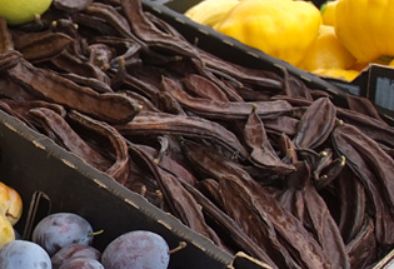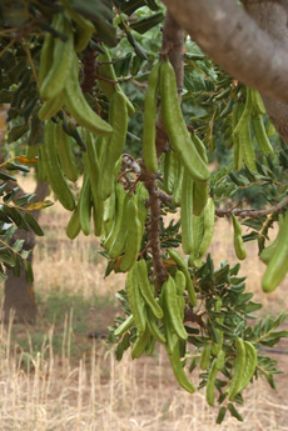JOHN THE BAPTIST
JOHN the BAPTIST
(Both Accounts)
Mat 11:3 And said unto him, Art thou he that should come, or do we look for another?
Luk 7:19 And John calling unto him two of his disciples sent them to Jesus, saying, Art thou he that should come? or look we for another?
John had been raised by his mother as to who his cousin was, that he was the "Lord." John's question here to Jesus in NO way shows any doubt as to who Jesus was coming from John His cousin. Many today see this record as maybe John's faith was failing him because he had been thrust into prison by Herod, but that is a misinterpretation of the verses in question. John did not doubt the Lord as some may preach it today, and those who do preach it shouldn't be in the pulpit at all.
John's question presented to Jesus through his disciples of "Art thou he that should come" in no wise appertained to Jesus as the "one that should come." John the Baptist has already proclaimed in Joh 1:29 The next day John seeth Jesus coming unto him, and saith, Behold the Lamb of God, which taketh away the sin of the world. John was well versed in the Old Testament and his question to Jesus was NOT about Jesus Himself but about another. (It was actually about himself, but John didn't know it at the time) John was asking Jesus if He was the one (fulfilling) the Old Testament scripture of Malachi 4 the prophet found here: Mal 4:5,6 Behold, I will send you Elijah the prophet before the coming of the great and dreadful day of the LORD: And he (John the Baptist) shall turn the heart of the fathers to the children, and the heart of the children to their fathers, lest I (Jesus) come and smite the earth with a curse.
We know this because right after the question was posed to Jesus, Jesus went into the explanation to the people just who John the Baptist was. Mat 11:7-15 And as they departed, Jesus began to say unto the multitudes concerning John, What went ye out into the wilderness to see? A reed shaken with the wind? But what went ye out for to see? A man clothed in soft raiment? behold, they that wear soft clothing are in kings' houses. But what went ye out for to see? A prophet? yea, I say unto you, and more than a prophet. For this is he, of whom it is written, Behold, I send my messenger before thy face, which shall prepare thy way before thee. JESUS was quoting Malachi in "Mal 3:1 Behold, I will send my messenger, and he shall prepare the way before me: and the Lord, whom ye seek, shall suddenly come to his temple, even the messenger of the covenant, whom ye delight in: behold, he shall come, saith the LORD of hosts. "Verily I say unto you, Among them that are born of women there hath not risen a greater than John the Baptist: notwithstanding he that is least in the kingdom of heaven is greater than he. And from the days of John the Baptist until now the kingdom of heaven suffereth violence, and the violent take it by force. For all the prophets and the law prophesied until John. And if ye will receive it, this is Elias, which was for to come. He that hath ears to hear, let him hear.
John the Baptist question then presented to Jesus by his disciples was asking Jesus if He was this messenger (to come) as well as the MESSIAH. Little did John know that his question to Jesus would prompt his cousin to (go into detail) about John's role in fulfilling Malachi 4:5,6 as the prophesied "Art thou he that should come? or look we for another?" inquiry to Jesus. Until Jesus spoke this when John was in the prison dungeon (if ye will receive it, this (John the Baptist) is Elias, which was for to come" John the Baptist had no idea that he was the (one for to come in Malachi 4:5 "Behold, I will send you Elijah the prophet before the coming of the great and dreadful day of the LORD".) John the Baptist didn't doubt one iota as to who his cousin was. He grew up until he entered the desert knowing Jesus was the Lord, just as his mother Elizabeth uttered to Mary. Luk 1:43 And whence is this to me, that the mother of my Lord should come to me?
Ministers, preachers, who teach that John the Baptist faith somehow failed him by sending his disciples to Jesus with the question "Art thou he that should come? or look we for another?" Don't know the Lord or the scriptures, they only think they do. Then there's another question within Jesus explanation of just who John the Baptist was, and that's the statement made by the Lord "Among them that are born of women there hath not risen a greater than John the Baptist." (Wasn't Jesus (born of a woman) and wasn't He a (greater prophet) than His cousin John the Baptist? Why did Jesus say this? In "Luk 7:26 But what went ye out for to see? A prophet? Yea, I say unto you, and much more than a prophet. Why was John much more than a prophet? What made him JTB more than a prophet? Because John the Baptist was born NOT only as a prophet, but born in the "Spirit of Elijah!" 2Ki 2:15 And when the sons of the prophets which were to view at Jericho saw him, (Elisha) they said, The spirit of Elijah doth rest on Elisha. And they came to meet him, and bowed themselves to the ground before him.
John the Baptist like Elisha not only had the "Spirit of Elijah" or the Double Portion of the Spirit of Elijah as did Elisha, but John the Baptist in fulfilling Malichi 4:5 must have had a "triple portion" of the same spirit of Elijah, Elisha, and his own Nazarite spirit. This is why Jesus could say "Among them that are born of women there hath not risen a greater than John the Baptist" Not even Elijah nor Elisha had the spirit of John the Baptist because John the Baptist was also a Nazarite from birth just as Samson. Luk 1:13-15 But the angel said unto him, Fear not, Zacharias: for thy prayer is heard; and thy wife Elisabeth shall bear thee a son, and thou shalt call his name John. And thou shalt have joy and gladness; and many shall rejoice at his birth. For he shall be great in the sight of the Lord, and shall drink neither wine nor strong drink; and he shall be filled with the Holy Ghost, even from his mother's womb. In reference to Samson in Jdg 13:7 But he 9the Angel) said unto me, Behold, thou shalt conceive, and bear a son; and now drink no wine nor strong drink, neither eat any unclean thing: for the child shall be a Nazarite to God from the womb to the day of his death.
John the Baptist was born (Born AGAIN) and
that set him apart from any other prophet that was born of a woman. This is why
Jesus could say "A prophet? Yea, I say unto you, and much more than a prophet." The
forerunner of the Lord (John the Baptist) was in his existence a "One of a Kind",
NOT in any way an equal of the Lord, but a unique individual different from all
the other prophets who had ever been born of women. John was a prophet, more
than a prophet, a Nazarite, and born again filled with the Holy Spirit from the
womb. Samson was born a Nazarite alone, where John the Baptist was born a
(prophet, a Nazarite, and "Born AGAIN") even from his mother's womb. This is
why the scripture records his diet. Have you ever wondered why God saw it
necessary to tell us about what John the Baptist ate for food? Mat 3:4 And the same John had his
raiment of camel's hair, and a leathern girdle about his loins; (Just as did
Elijah) and his
meat was locusts and wild honey.
(This does NOT mean that John the Baptist ate "bugs" i.e. locusts or grasshoppers.) In the Middle East grows a bush with "pods" called the Locust bush. In the West we call it Carob. It's a form of food used in the Middle East. John the Baptist ate Carob from the pods of the Locust bush and wild honey.)

Carob Beans
It grows to about 15 m (50 ft) in height and has dark, evergreen, pinnate leaves. The small, red flowers have no petals. The fruit is a brown, leathery pod about 10 to 30 cm (4 to 12 in) long and contains a syrupy to biscuity flesh of an agreeable sweet taste, in which lie a number of seeds. The pods are edible and are often used for livestock feed. The seeds, which are remarkably uniform in size and weight, are thought to have been the original standard carat weight used by jewellers and goldsmiths.
With their deep root system and specially adapted leaf surfaces Sweet Carobs are adapted to dry conditions, saline water and intense heat. They complement other shrubs and trees which can be included in farming systems for dry areas such as saltbush, olives and honey locusts as well as bush tucker, timber and woodlot species. Carobs are also fire resistant and provide green pick and shelter for livestock.
A mature female Carob tree can produce up to 100 kilos of beans, each pod containing roughly the energy of a Mars Bar. That's 300,000 Mars Bars per hectare! Apart from the stock feed value of the beans, the health food market currently pays between $1.50 and $3.00 per kilo for carob.
The tree is a perennial leguminous tree native to the Mediterranean basin and south-west Asia. It has been cultivated for over 4,000 years. It grows productively to an altitude of 1215 m, with a life span of more than 100 years. It is tolerant of moderately high salinity levels (ACIL 1984). World carob pod production is approximately 320,000 tonnes year (Tous et al. 1996).

2Ki 1:8 And they answered him, He was an hairy man, and girt with a girdle of leather about his loins. And he said, It is Elijah the Tishbite.
If you could see both Elijah and John the Baptist from a distance, you to would probable asy they both were "hairy men" simply because of their dress. Both wore skins, both wore "a girdle of leather about his loins." John the Baptist was more than any other prophet simple because of the fact he was the "forerunner" paving the way of the Savior of the World. This Elijah nor Elisha had the privilege of doing, and this is what made John the Baptist "much more than a prophet."
The WATCHMAN !!!
